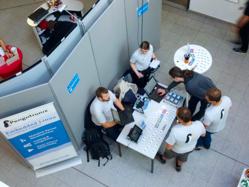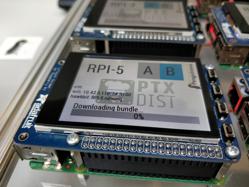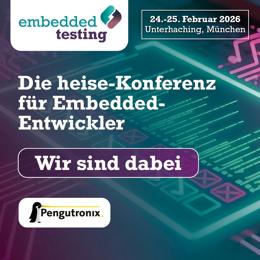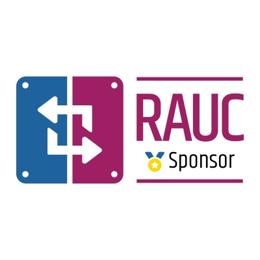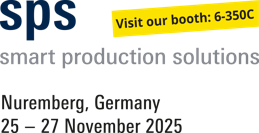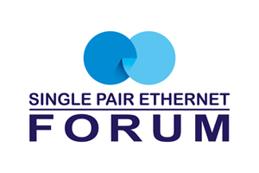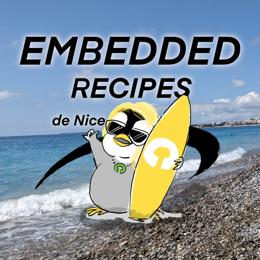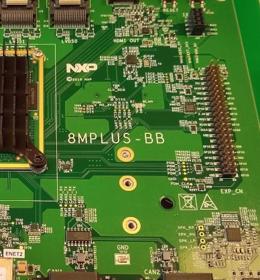Pengutronix at FrOSCon 2018
This year, a team from Pengutronix attended FrOSCon in St. Augustin for the first time. We took the opportunity to shake hands, talk about our latest developments and meet hackers interested in working with embedded Linux.
To show some of our work, we brought a demo for updating embedded devices with RAUC and hawkBIT and a Video Demo based on a fully open-source graphics stack with Etnaviv, Weston and GStreamer, cycling through four of the Blender Project's Open Movies in HD resolution.
Our hardware hacker had some fruitful discussions about electronic designs and possible use-cases for tools like our USB-SD-Mux, that makes the annoying juggling of SD cards between development host and target hardware a remnant of the past. When we started with that project, we would never have guessed that there was such a high demand for such a device, but from the large number of interested questions we gather that this is a niche that needs to be filled.
We also recognize that testing embedded devices is becoming an increasingly important and visible subject in the community. This motivates us to continue our efforts around this topic.
Besides that, our Penguin stickers and black pencils were popular as usual ;)
We'd like to thank FrOSCon Team for this great conference.
Weiterführende Links
Pengutronix bei der Embedded Testing 2026
Pengutronix ist in diesem Jahr wieder Partner der der Embedded Testingu nd ist dort sowohl mit einem Stand als auch mit einem Vortrag vertreten. Die Embedded Testing findet am 24. und 25. Februar 2026 in Unterhaching bei München statt.Pengutronix at FOSDEM and OE Workshop 2026
On January 31st and Febuary 1st 2026 it is once again time for waffles, Belgian beer and Open Source: FOSDEM will take place at ULB in Brussels. With over 8k hackers, FOSDEM is the biggest and most important Open Source conference in Europe. One other event riding the wave of FOSDEM is the the OpenEmbeddedWorkshop. The full list of co-located events is here. We are participating in both FOSDEM and OE Workshop and are looking forward to many interesting discussions with developers of different Open Source software components – be it the Linux kernel, Yocto, Labgrid, Debian, and others...
RAUC und labgrid Sponsoring-Pakete ab jetzt im Shop!
RAUC und labgrid sind Open Source Software-Projekte, die beide bei Pengutronix gestartet wurden und in ihren jeweiligen Nischen mittlerweile recht erfolgreich geworden sind. Ab heute ist es möglich Sponsoring-Pakete im Linux Automation GmbH Shop zu erwerben, die die Entwicklung dieser Projekte unterstützen.RAUC v1.15 Released
It’s been over half a year since the RAUC v1.14 release, and in that time a number of minor and major improvements have piled up. The most notable change in v1.15 is the newly added support for explicit image types, making handling of image filename extensions way more flexible. Other highlights include improved support for A/B/C updates and several smaller quality improvements. This release also includes the final preparations for upcoming features such as multiple signer support and built-in polling.
Pengutronix auf der SPS in Nürnberg
Nach einigen Jahren Abwesenheit sind wir in diesem Jahr zurück auf der SPS 2025 in Nürnberg! Sie finden uns in Halle 6, Stand 6-350C. Wir freuen uns darauf neue und bekannte Freunde, Partner und Kunden zu treffen. Wie immer zeigen wir Demonstratoren zu aktuellen Themen an unserem Messestand.
GStreamer Conference 2025
This years GStreamer conference was held at the end of Oktober in London, UK. Since GStreamer is our goto-framework for multimedia applications, Michael Olbrich and me were attending this years conference to find out what's new in GStreamer and get in touch with the community.
Pengutronix beim Single Pair Ethernet Forum in Ludwigsburg
Single Pair Ethernet (SPE) sind mehrere neue Ethernet Standards, bei denen die Kommunikation über nur ein einzelnes Adernpaar funktioniert. Embedded Linux ist dabei gerade auch für kleinste, über SPE angebundene Knoten bestens geeignet. Pengutronix ist dieses Jahr Partner des Single Pair Ethernet Forums in Ludwigsburg und trägt darüber hinaus einen Vortrag bei.
Talks, Workshops und Zeit am Strand - Die Embedded Recipes 2025
Ich war dieses Jahr Teil einer kleinen Delegation Pengutronixianer, die an der Embedded-Recipes-Konferenz in Nizza, Frankreich teilgenommen haben. Wir hatten eine tolle Zeit in Nizza und wollen jetzt die Gelegenheit nutzen nochmal einen Blick zurück auf unsere Lieblingstalks und unseren labgrid-Workshop zu werfen.
RAUC - 10 Years of Updating 🎂
10 years ago, almost a decade before the Cyber-Resilliance-Act (CRA) enforced updates as a strict requirement for most embedded systems, Pengutronix started RAUC as a versatile platform for embedded Linux Over-The-Air (and Not-So-Over-The-Air) updates.
Showcase: Grafik auf i.MX8MP
Die Inbetriebnahme der Grafikausgabepipeline auf dem i.MX8M Plus (kurz i.MX8MP) ist ein aktuelles Beispiel dafür, wie Open Source und Upstream-Treiber für GPUs und Displayeinheiten Aufwand und Risiko im Projekt reduzieren können.


